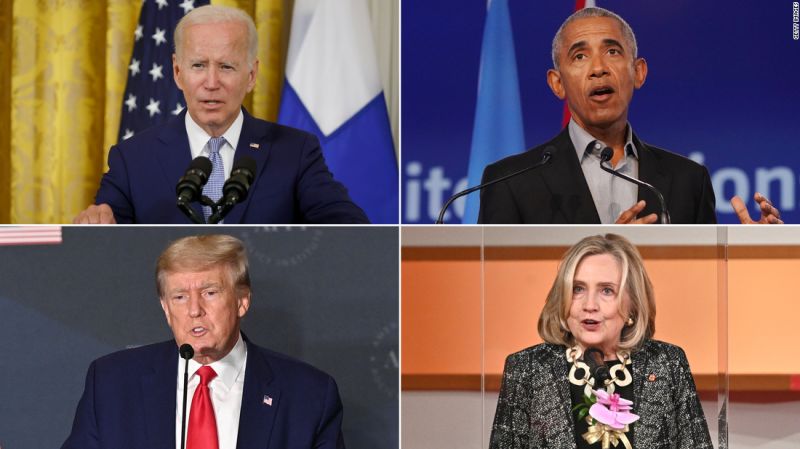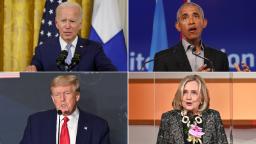

A version of this story appears in CNN’s What Matters newsletter. To get it in your inbox, sign up for free here.
CNN
—
The heavy hitters of American politics are hitting the campaign trail to deliver some closing arguments about the importance of next Tuesday’s election.
But their messages might not be sinking in.
President Joe Biden told donors in Florida this week that “democracy is on the ballot.”
Later, in a speech from Washington, DC, he warned about political violence across the country.
But in a nod to the realities of his own political toxicity, Biden has largely avoided events to whip up voters in states with key races.
RELATED: Live updates from the end of campaign season
In Arizona, former President Barack Obama, who is extremely popular and a real draw for Democrats, told a rally that if a slate of Republican election deniers there wins next week, “Democracy as we know it may not survive in Arizona.”
He added: “That’s not an exaggeration. That is a fact.”
Candidates for secretary of state in Arizona and Nevada, in particular, have promised to upend the election systems there to guard against widespread voter fraud, for which there is no evidence.
Former President Donald Trump will kick off his closing blitz of rallies starting in Iowa, which is not the site of the most hotly contested Senate race but is home to the first presidential preference contest in the coming 2024 primaries.
At an earlier rally in Texas, Trump framed the election as an opportunity for the “MAGA movement” to take back the country from Democrats.
CNN’s Gabby Orr and Jeff Zeleny have an excellent look at where Trump is going, who he is appearing with and what it may mean. Note: Trump is not campaigning with Florida Gov. Ron DeSantis, but he is campaigning in Florida.
Former Secretary of State Hillary Clinton is hitting the campaign trail, too – in particular to help Gov. Kathy Hochul, the flagging Democratic incumbent in New York, who has struggled to combat her GOP challenger Rep. Lee Zeldin’s message that he’d be better equipped to handle crime.
In an extended interview on CNN Thursday morning, Clinton told Don Lemon that Republicans are trying to scare voters with the crime message.
Democrats want voters to be afraid about the future when they vote, but Clinton admitted it can be difficult to make a pitch about what might happen as opposed to what’s happening.
“I would boil it down to this: It’s really difficult to tell people what’s going to happen in the future when, understandably, they are focused on the present. So, yes, people are worried about the cost of living, they’re worried about the economy,” she said.
RELATED: 5 very scary numbers for Democrats in the new CNN poll
The former Washington, DC, police officer Michael Fanone, who was injured during the January 6, 2021, riot at the US Capitol, is less understanding than Clinton in what he’s written for CNN Opinion.
“Until last week’s brutal assault against Paul Pelosi, the husband of House Speaker Nancy Pelosi, political candidates, including many Democrats, avoided talking about January 6. Apparently, polls show that swing voters care more about gas prices and abortion,” he wrote in frustration.
“The biggest threat to democracy is indifference, which I believe will be our downfall as a nation,” he later added. “We don’t seem to care enough to pay attention to what’s happening to our country.”
Messages from Biden, Obama, Trump, Clinton and Fanone are about the country as a whole. But this election, at its core, is about 435 House seats, 35 Senate races, 36 races for governor, and every other person who has worked to put their name on a ballot.
There are so many election previews, it’s hard to keep track of them all at this point.
CNN’s Simone Pathe has her final look at the 10 Senate seats most likely to flip. Unlike the House, where the emerging consensus (for whatever that’s worth) is that Republicans have a very strong chance to seize a commanding majority, control of the Senate remains a question mark.
Key line from Pathe: “Every race will matter on Election Day as Republicans look to win control of the evenly divided chamber and severely curtail the second half of President Joe Biden’s term.”
And I’ll add my own note here: Neither party will emerge with the 60 votes needed to break a filibuster. The Senate will remain a roadblock regardless of who controls committees and the floor schedule.
CNN’s Eric Bradner and David Wright note that in key races like the Senate contests in Wisconsin and Pennsylvania, where GOP candidates had spent the primary season appealing to the Trump wing of the party, they are now trying to moderate their positions.
I love the way they begin this report:
Republican Sen. Ron Johnson of Wisconsin is raking leaves, asking if voters are “tired of the division and the anger.” Tim Michels, the GOP nominee for governor, is driving a red pickup truck, promising a “new direction for Wisconsin.”
They noted a similar approach in multiple races where Republicans who had been hitting hard against Democrats are now appealing to the voters who are tired of politics.
Their bottom line: The GOP appeals, which follow months of hard-hitting attacks on their Democratic opponents on crime and inflation, appear to be focused on winning over moderate voters, while Democrats are drawing sharp contrasts aimed at energizing their base and spoiling those Republican efforts.
